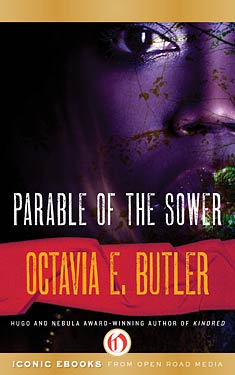Octavia
Butler
Completed 4/16/2018,
Reviewed 4/16/2018
5 stars
This was a dark, depressing novel. It’s a dystopian tale of a future US where
society has broken down, crime is rampant, and survival is tenuous. I could only read it in small chunks, a few
chapters at a time at the most.
Nonetheless, it was an excellent story about survival in a terrible
time. I’ve seen some reviewers categorize
this book as YA, and the prose somewhat reads as YA, but I think it’s really a
story for adults about a young person with a personal faith and the will to
survive.
 The book is about Lauren, a young African-American girl growing
up in an LA suburb in the 2020’s. Society
has broken down and her little cul-de-sac has built a wall around the eleven
houses on the street to protect itself. Money
is practically worthless and few people have jobs that pay actual money. Crime is rampant, with desperate people
stealing to survive, and people addicted to a new drug called pyro are burning
everything in sight. Lauren’s little
community has banded together to learn survival and defense skills. They help each other out, even if they don’t
like each other. Her mother acts as a
teacher of the local children. Her
father is a preacher and a professor at the local college.
The book is about Lauren, a young African-American girl growing
up in an LA suburb in the 2020’s. Society
has broken down and her little cul-de-sac has built a wall around the eleven
houses on the street to protect itself. Money
is practically worthless and few people have jobs that pay actual money. Crime is rampant, with desperate people
stealing to survive, and people addicted to a new drug called pyro are burning
everything in sight. Lauren’s little
community has banded together to learn survival and defense skills. They help each other out, even if they don’t
like each other. Her mother acts as a
teacher of the local children. Her
father is a preacher and a professor at the local college.
Lauren however is different.
She an empath, she can feel other people’s physical pain and
pleasure. She’s basically rejected her
father’s Baptist faith and devised her own religion, which she calls
Earthseed. She also feels that the key
to her survival in this terrible world is to try to travel north to a safer
land.
One night, extreme violence invades the community. She’s forced to leave before she was ready,
but decides it’s the only choice she has.
On her way north, she picks up a ragtag group of others who she slowly
converts to Earthseed.
Butler’s vision is astounding. This dystopia is about as well-devised as
some of the post-nuclear apocalypse stories of the fifties and sixties. And yet she leaves it vague as to exactly
what the cause was, other than the inevitable collapse of things based on where
we seem to be going. The little
community that the first half of the book takes place in is what I would call
excellent world-building, even though it’s only eleven houses. From target practice to martial arts training
to what dinner consists of, Butler gives us an amazingly intimate portrait of
what life would be like in a terrible time.
The character development is also astounding. Despite there being a lot of characters
throughout the story, I felt like Butler did a really great job of creating
distinct personalities. It says a lot
when I can keep myriads of characters straight in my head.
But as I mentioned above, it was a really difficult book to
get through. The world-building is so
good, that I could only read small portions at a time lest I get too depressed,
and convinced that this is where we are going to end up if things don’t change.
I’m both excited and hesitant about reading the next book,
because I know it will be more of the same.
I think I’m going to read a few other books in between so as to break up
the feelings of hopelessness that one could get from reading a book like this.
I have to give this book five stars out of five because of
my definition of my star system. It’s a book that I would give four stars to
but I had a deep emotional response to it.
Usually, that feeling is joy or sorrow.
This time it was depression and despair.
For a book to evoke that much emotion in me says something about how
terrific it is. Granted they were
emotions that I would rather not have but they were deep nonetheless.
No comments:
Post a Comment